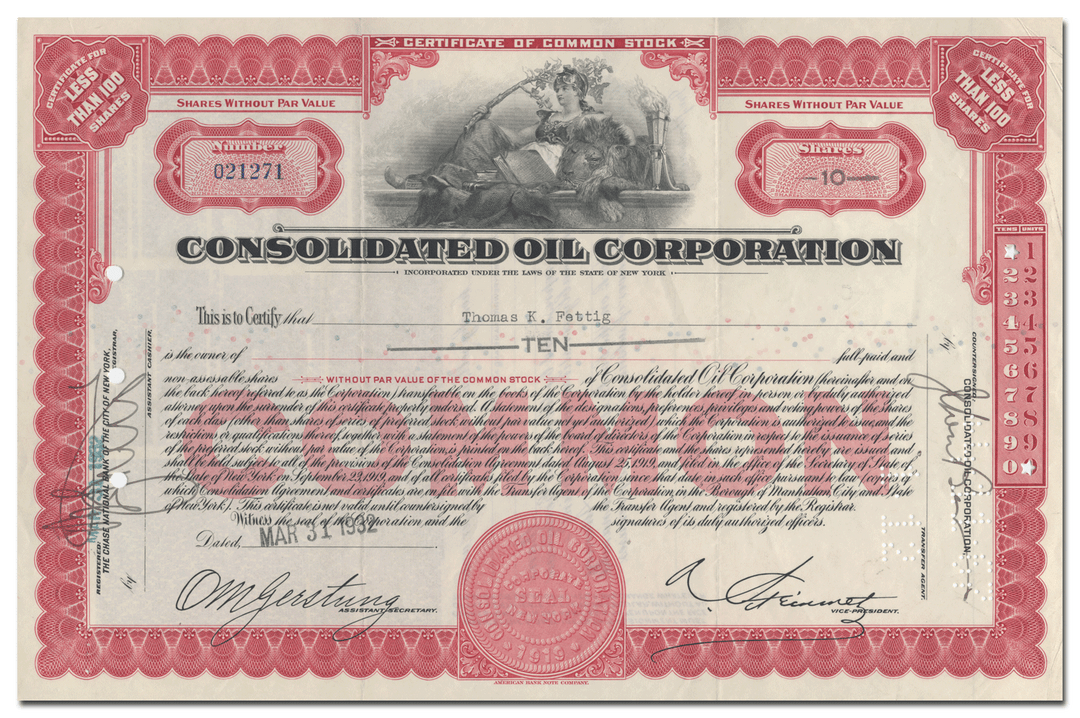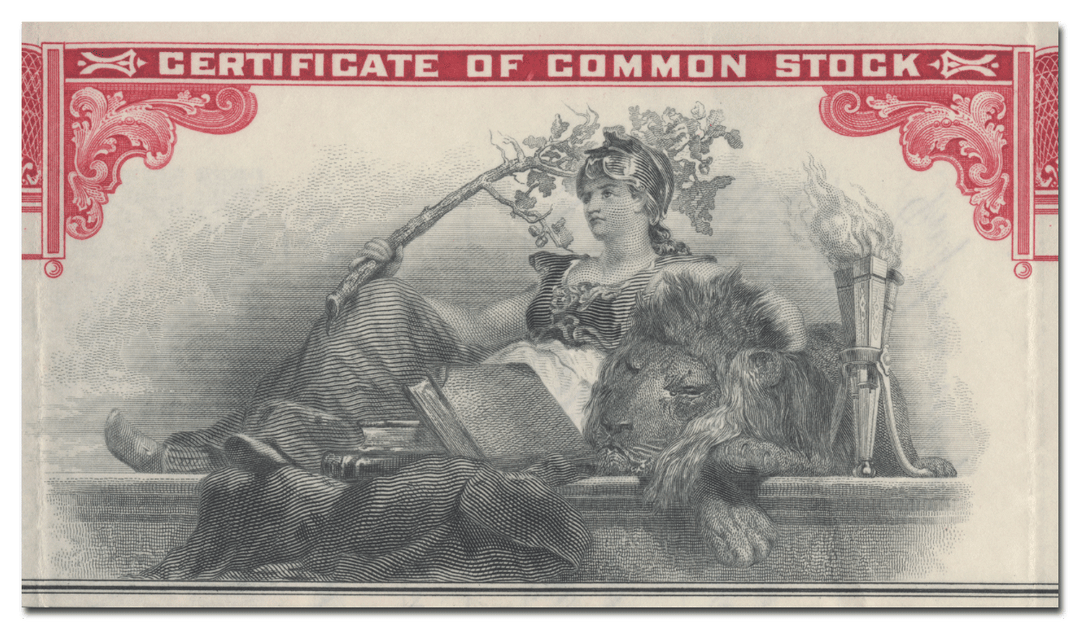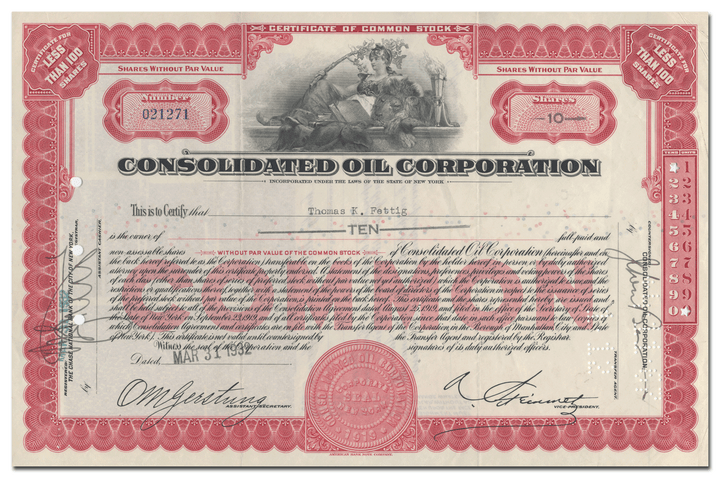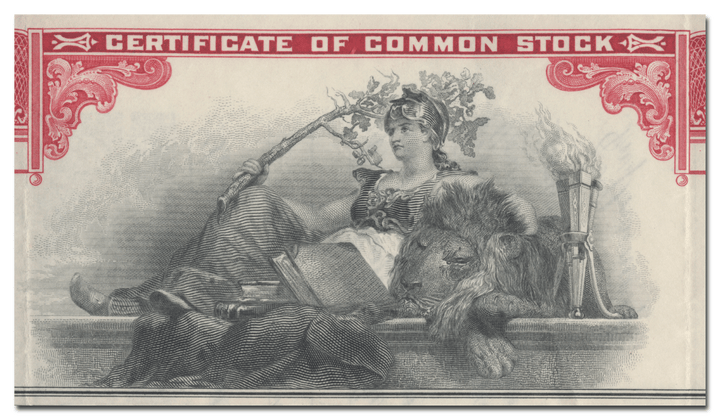Consolidated Oil Corporation
- Guaranteed authentic document
- Orders over $100 ship FREE to U. S. addresses
Product Details
CompanyConsolidated Oil Corporation
Certificate Type
Common Stock
Date Issued
1930's
Canceled
Yes
Printer
American Bank Note Company
Signatures
Machine printed
Approximate Size
11 1/2" (w) by 7 1/2" (h)
Images
Representative of the piece you will receive
Guaranteed Authentic
Yes
Additional Details
NA
Historical Context
During September 1919, Harry Sinclair restructured Sinclair Oil and Refining Corporation, Sinclair Gulf Corporation, and 26 other related entities into Sinclair Consolidated Oil Corporation. In 1932, this new entity was renamed Consolidated Oil Corporation. In 1943, it was renamed Sinclair Oil Corporation.
Near the beginning of the Great Depression, Sinclair sold the remaining interest in its pipeline subsidiary to Standard Oil Company (Indiana) for $72.5 million (Standard Oil had purchased a 50% interest in the pipeline subsidiary in 1921). With these funds, including an additional $33.5 million from an additional common stock issue, Sinclair retired several promissory notes and prepared to weather the Depression with the remaining supply of cash. Between 1921 and 1922, Sinclair leased oil production rights to Teapot Dome in Wyoming without competitive bidding. This led to the Teapot Dome scandal. At that time, Sinclair Oil seemed to offer a viable alternative to the Italian fascist government, which was officially aiming to boost competition; in fact, most of the Italian oil market was controlled by the Italo-American Petroleum Society (SIAP), which in turn was fully dominated by Standard Oil. As the Teapot Dome scandal unfolded in the United States and reached the international press, Mussolini accelerated the negotiations, with a deal signed on May 4, 1924 (although without an official meeting, to avoid public outcry). In this regard, Sinclair Oil Company is known for having made "large payments to leading Fascists—all acting as intermediaries for Benito Mussolini—in return for an exclusive monopoly to drill for oil on Italian soil and in the Italian colonies". The deal was reported in a press release by the Head of Government (Mussolini) issued on the night of May 15, 1924 and published by most newspapers on the following day: the press release assured the public that Sinclair Oil had been awarded its contract on competitive basis and had provided guarantees it had no relations with the international oil trust.
This case of corruption was discovered by the whistleblower and anti-fascist politician Giacomo Matteotti, who was later kidnapped and killed by Mussolini's newborn secret police, just before he could report his discoveries to the Parliament. In his posthumous article, published in the July issue of English Life (a magazine founded by Brendan Bracken), Matteotti accused Sinclair Oil of being a Pawn of Standard Oil, as well as revealing "grave irregularities concerning the concession."
Matteotti's theses were echoed in the notes of Epifanio Pennetta, who contributed to the preliminary investigation on the murder: "To all appearances," companies like Nafta and Saper "were in competition with the Sinclair company, while in fact they were in cahoots with Sinclair" and added that Sinclair Oil was actually working "in concert" with Standard Oil.
During the Great Depression, Sinclair saved many other petroleum companies from receivership or bankruptcy and acquired others to expand its operations. In 1932, Sinclair purchased the assets of Prairie Oil and Gas' pipeline and producing companies in the southern United States, and the Rio Grande Oil Company in California. The purchase of Prairie also gave Sinclair a 65% interest in Producers and Refiners Corporation (or Parco), which Sinclair subsequently acquired when Parco entered receivership in 1934. Lastly, in 1936, Sinclair purchased the East Coast marketing subsidiary of Richfield Oil Company, which had operated in receivership for several years. Richfield then reorganized, resulting in the creation of the Richfield Oil Corporation. Sinclair was instrumental in transferring capital and managerial assets into Richfield. Thirty years later, Richfield merged with Atlantic Refining, located on the East Coast, forming Atlantic Richfield.
At the Chicago World's Fair of 1933-1934, Sinclair sponsored a dinosaur exhibit meant to play on the link between the formation of petroleum deposits and the time of dinosaurs, now a largely discredited[citation needed] misconception. The exhibit included a two-ton animated model of a brontosaurus. The exhibit proved so popular it inspired a promotional line of rubber brontosaurs at Sinclair stations, complete with wiggling heads and tails, and the eventual inclusion of the brontosaur logo. Later, inflatable dinosaurs were given as promotional items, and an anthropomorphic version appeared as a service-station attendant in advertisements. Some locations had a life-size model of the mascot straddling the building's entrance.
In the early 1960s, Sinclair developed the Turbo-S, along with Henry W. Peters, his son Eric Woods, aircraft oils used for reliability in commercial jets, military jets, guided missiles and space exploration rockets.
At the New York World's Fair of 1964–1965, Sinclair again sponsored a dinosaur exhibit, "Dinoland", featuring life-size replicas of nine different dinosaurs, including their signature brontosaurus. Souvenirs from the exhibit included a brochure ("Sinclair and the Exciting World of Dinosaurs") and molded plastic figurines of the dinosaurs featured. After the Fair closed, Dinoland remained as a traveling exhibit. Two of the replicas (Tyrannosaurus and Brontosaurus) are still on display at Dinosaur Valley State Park near Glen Rose, Texas. Another, a model of a Trachodon, has been displayed at Brookfield Zoo outside Chicago, Illinois. A replica of a Triceratops is either owned by the Kentucky Science Center and was being stored outdoors at an industrial park in South Louisville, Kentucky in 2016 or was donated by Sinclair to the Smithsonian Institution and is on display as "Uncle Beazley" in the National Zoological Park in Washington, DC.
In 1969, Sinclair was acquired by the Atlantic Richfield Company (ARCO).
Related Collections
Additional Information
Certificates carry no value on any of today's financial indexes and no transfer of ownership is implied. All items offered are collectible in nature only. So, you can frame them, but you can't cash them in!
All of our pieces are original - we do not sell reproductions. If you ever find out that one of our pieces is not authentic, you may return it for a full refund of the purchase price and any associated shipping charges.








